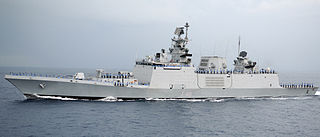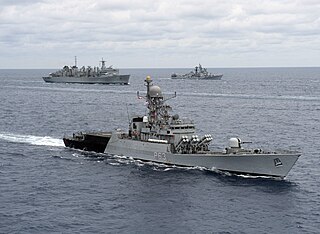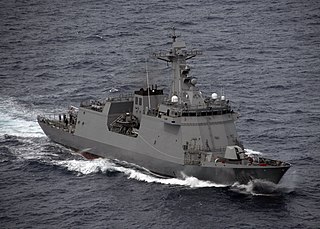
The Delhi-class destroyers are guided-missile destroyers of the Indian Navy. Three ships of this class are in active service. The Delhi-class vessels were the largest vessels to be built in India at the time of their commissioning. The ships were built by Mazagon Dock Limited (MDL) at a cost of ₹750 crore each.

The "Kolkata class" (Project 15A) are a class of stealth guided missile destroyers constructed for the Indian Navy. The class comprises three ships – Kolkata, Kochi and Chennai, all of which were built by Mazagon Dock Limited (MDL) in India, and are the largest destroyers to be operated by the Indian Navy. Due to delays in construction and sea trials, the initial commissioning date of the first ship of the class was pushed back from 2010 to 2014.

The Talwar-class frigates or Project 11356 are a class of stealth guided missile frigates designed and built by Russia for the Indian Navy. The Talwar-class guided missile frigates are the improved versions of the Krivak III-class frigates used by the Russian Coast Guard. The design has been further developed as the Admiral Grigorovich-class frigate for the Russian Navy. Six ships were built in two batches between 1999 and 2013.

The Brahmaputra-class frigates are guided-missile frigates of the Indian Navy, designed and built in India. They are an enhancement of the Godavari class, with a displacement of 3850 tons and a length of 126 metres (413 ft). Although of similar hull and dimension, internally, the Brahmaputra and Godavari classes have different configurations, armaments and capabilities. 3 ships of this class serve in the Indian Navy.
The Nilgiri-class frigates were updated versions of the Leander class, designed and built for the Indian Navy by Mazagon Dock Limited in Mumbai. Six ships were built between 1972–81. Vessels of the class formed the 14th Frigate Squadron. The lead ship INS Nilgiri was the first major warship to be built in India and was built in collaboration with Yarrow Shipbuilders of the United Kingdom.

Mazagon Dock Shipbuilders Limited (MDL), formerly called Mazagon Dock Limited, is a shipyard situated in Mazagaon, Mumbai. It manufactures warships and submarines for the Indian Navy and offshore platforms and associated support vessels for offshore oil drilling. It also builds tankers, cargo bulk carriers, passenger ships and ferries.

The Shivalik class or Project 17 class is a class of multi-role stealth frigates in service with the Indian Navy. They are the first stealth warships built in India. They were designed to have better stealth features and land-attack capabilities than the preceding Talwar-class frigates. A total of three ships were built between 2000 and 2010, and all three were in commission by 2012.

Garden Reach Shipbuilders & Engineers Ltd, abbreviated as GRSE, is one of India's leading shipyards, located in Kolkata, West Bengal. It builds and repairs commercial and naval vessels. Presently GRSE has also started building export ships in a mission to expand its business.

Kora-class corvettes are guided missile corvettes, in active service with the Indian Navy and the National Coast Guard of Mauritius. Four vessels were built at Garden Reach Shipbuilders and Engineers (GRSE) and outfitted at Mazagon Dock Limited (MDL).

INS Kora is the lead ship of the Kora-Class of 1,350-tonne guided missile Corvettes in active service with the Indian Navy. The vessel was built at Garden Reach Shipbuilders and Engineers (GRSE) and outfitted at Mazagon Dock Limited (MDL).

INS Nilgiri (F33) was the lead ship of her class of frigates. Commissioned on 3 June 1972 into the Indian Navy, she was decommissioned in 1996.
INS Himgiri (F34) was a Nilgiri-class frigate of the Indian Navy. Himgiri was commissioned into the Navy on 23 November 1974. She was decommissioned on 6 May 2005.

INS Kiltan (P30) is an anti-submarine warfare corvette of the Indian Navy built under Project 28. It is the third of four Kamorta-class corvettes. The ship was built by the Garden Reach Shipbuilders and Engineers (GRSE), Kolkata, launched on 26 March 2013, and commissioned on 16 October 2017. Kiltan represents a leap forward in the Navy's attempts at localisation with as much as 90% of its content drawn from India itself.
The Anti-Submarine Warfare Shallow Water Craft (ASW-SWC) corvettes, are a class anti-submarine warfare vessels currently being built for the Indian Navy, by Cochin Shipyard (CSL) and Garden Reach Shipbuilders & Engineers (GRSE). They were conceived as a replacement to the ageing Abhay-class corvettes of the Indian Navy, and are designed to undertake anti-submarine warfare (ASW) duties – including subsurface surveillance in littoral-waters, search-and-attack unit (SAU) missions and coordinated anti-submarine warfare operations with naval aircraft. They were also designed to provide secondary duties – including defense against intruding aircraft, minelaying and search-and-rescue (SAR).

The Indian Navy has been focusing on developing indigenous platforms, systems, sensors and weapons as part of the nation's modernisation and expansion of its maritime forces. As of 2020 the Indian Navy has 43 vessels of various types under construction, including an aircraft carrier; destroyers; frigates; corvettes; and conventional-powered and nuclear-powered submarines and plans to build a strong navy of 200 vessels and 500 aircraft by 2050. In 2013 a senior naval official outlined the Indian Navy's intention to build a 200 ship navy over a 10-year period. According to Chief of Naval Staff's statement in December 2020, India has transformed from a buyer's navy to a builder's navy. All 41 ships under construction are being produced in Indian shipyards, both publicly and privately owned. However some projects have suffered from long delays and cost overruns.

The Visakhapatnam-class destroyers, also classified as the P-15 Bravo-class, or simply P-15B, is a class of guided-missile destroyers currently being built for the Indian Navy. Visakhapatnam class is an upgraded derivative of its predecessor, the Kolkata-class, with improved features of stealth, automation and ordnance.

The Jose Rizal-class of multi-role lightweight frigates, currently in service with the Philippine Navy, are a heavily modified variant of the ROK Navy's Incheon-class frigates. The ships, which were built by Hyundai Heavy Industries (HHI), are specifically accommodated to fit the requirements of the Philippine Navy. The frigates will improve the ability of the Philippine Navy's Offshore Combat Force, which is mostly composed of ships that were retired from other countries and subsequently transferred to the Philippines.

INS Nilgiri is the lead ship of the Nilgiri-class stealth guided missile frigates being built by Mazagon Shipyard Dock Limited for the Indian Navy. The ship was laid down on 28 December 2017 and it was launched on 28 September 2019. The ship is expected to be commissioned by August 2022.

INS Himgiri is the second ship of the Nilgiri-class stealth guided missile frigates being built by Garden Reach Shipbuilders and Engineers for the Indian Navy. The ship was laid down on 10 November 2018 and it was launched on 14 December 2020. The ship is expected to be commissioned by August 2023.

















